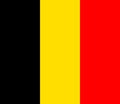Future Leaders of Europe
Q. Mr. President, how do you think your speech was received tonight?
The President. Oh, very well. I mean, you know, we consciously picked a very small room, and the Europeans are normally much more polite when speeches are given like that. It was a serious speech. But a lot of the students came up to me afterwards and said that they were pleased to know that we were thinking about their future and that they found the ideas basically things they agreed with. I was very encouraged——
Q. Mr. President, can you tell us about the Ukraine?
The President. ——and then after I got out into the crowd in the Place, there was much more sort of overt enthusiasm. And the Prime Minister and others were saying, "You know, that's the way we are. We're restrained in speeches, but these people are glad to see you. Look at the Place."
Ukraine
Q. What can you tell us about the Ukraine, Mr. President? Are you close to an agreement, or do you have an agreement? Can Kravchuk sell it? Might we go to Kiev?
The President. All I can tell you tonight is that we worked very, very hard to bring the three of us together, and we've made a terrific amount of progress. And at least when I left to go to the speech I was not in a position to make an announcement.
Q. But you think it might be possible that this could happen and that Kravchuk could sell it?
The President. Well, I don't want to—presumably, Mr. Kravchuk wouldn't agree to anything he didn't think he could sell. I think—I feel— I'm proud of the work that's been done, and I appreciate very much the attitude that Kravchuk and Yeltsin have brought to this whole endeavor. But I don't think I can say any more tonight. I don't even want to——
Partnership For Peace
Q. Do you think Eastern European countries are going to be reassured by the Partnership For Peace?
The President. I hope so.
Q. [Inaudible]—giving Russia veto?
The President. I think they need to know this is not a question of veto power. But keep in mind there are certain responsibilities inherent in being in NATO, first of all, that NATO allies all remind each other of all the time. And what I said tonight I want to reemphasize. What I want to do is to leave open the possibility of creating the best possible future for Europe, where they all have the chance to be democracies, they all have a chance to be market economies, they all have a chance to respect one another's securities and to support it and to do it in a way that also permits us to do the best we can if the best future is not open to us. That's what the Partnership For Peace does. It's not giving anybody a veto on future NATO membership.
Bosnia
Q. But what do you say to people who say that NATO isn't relevant if it can't guarantee the peace, let's say, in Bosnia?
The President. Well, that was never the purpose of NATO. The purpose of NATO was to guarantee the peace and security of the countries that were member nations. And when the United States asked NATO to approve some actions in and around Bosnia, it was the first time we'd ever done anything out of the area of the NATO members themselves.
So we're working on this. It's not been established yet that anyone is capable of solving a civil war in another country. That's not been established yet.
Q. [Inaudible]—air strikes will be discussed
tomorrow, air strikes possible tomorrow? The President. Good night, everybody.
NOTE: The exchange began at approximately 8:30 p.m. at the Au Vieux Saint Martin Restaurant. A tape was not available for verification of the content of this exchange.
William J. Clinton, Exchange With Reporters in Brussels, Belgium Online by Gerhard Peters and John T. Woolley, The American Presidency Project https://www.presidency.ucsb.edu/node/219028


